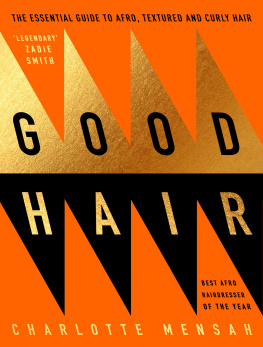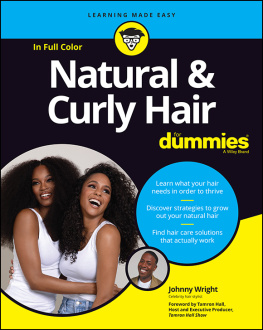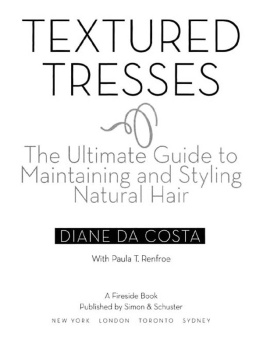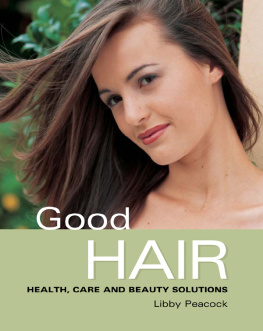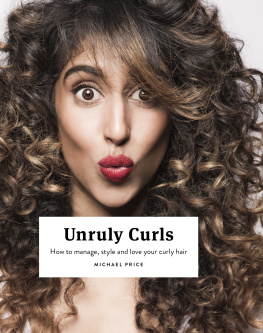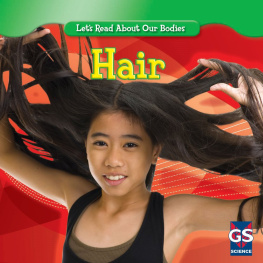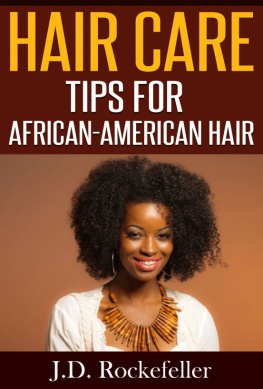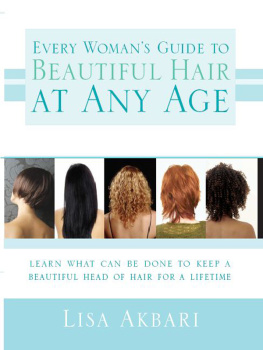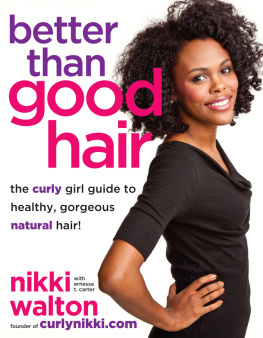
WRITE-ON PAGES
Any references to writing in this book refer to the original printed version.
Readers should write on a separate piece of paper in these instances.
Charlotte Mensah
GOOD HAIR
The Essential Guide to Afro, Textured and Curly Hair

PENGUIN BOOKS
UK | USA | Canada | Ireland | Australia
India | New Zealand | South Africa
Penguin Books is part of the Penguin Random House group of companies whose addresses can be found at global.penguinrandomhouse.com.

First published 2020
Copyright Charlotte Mensah, 2020
The moral right of the author has been asserted
Cover design by Holly Ovenden
The information in this book has been compiled by way of general guidance in relation to the specific subjects addressed, but is not a substitute and not to be relied on for legal, accounting, tax or other professional advice on specific circumstances and in specific locations. So far as the author is aware the information given is correct and up to date as at 31 May 2020. Practice, laws and regulations all change, and the reader should obtain up to date professional advice on any such issues. The author and publishers disclaim, as far as the law allows, any liability arising directly or indirectly from the use, or misuse, of the information contained in this book.
Credit for in-text images: photo , hair: Charlotte Mensah, photographer: Krystoff Krychik, make-up: Sam Lascelle.
Credit for plate section 1: Charlotte Mensah + Lily Bertrand-Webb
Credit for plate section 2: Lily Bertrand-Webb
ISBN: 978-0-241-98817-6
This ebook is copyright material and must not be copied, reproduced, transferred, distributed, leased, licensed or publicly performed or used in any way except as specifically permitted in writing by the publishers, as allowed under the terms and conditions under which it was purchased or as strictly permitted by applicable copyright law. Any unauthorized distribution or use of this text may be a direct infringement of the authors and publishers rights and those responsible may be liable in law accordingly.
This book is dedicated to my father Seth Mensah
In loving memory of my mother Love Naa Densua Doodo
My grandmother Mary Owusua Thompson
My grandfather Michael Kofi Sefah (Dada)
This is my gift to you.
Foreword
Charlotte Mensah is a legendary Black British hairdresser who combines the traditional techniques of her Ghanaian birthright with the Stonebridge Estate swagga of her Ladbroke Grove childhood. Her famous salon is also located right on the border between two worlds: close enough to Notting Hill to smell the Pilates but not so far from Kensal Rise that you cant hear a bell ring above a patty shop. From Willesden myself, I found Charlottes in a moment of hair emergency. I think I found her by googling GREAT BLACK-BRITISH HAIRDRESSERS. Google is good for some things. And there she was, like an answer to a prayer. Id been looking for someone like Charlotte a long time. As a kid, it was always my mum or auntie who did my braids, and I took their skills for granted, perhaps imagining theyd always be available for a seven-hour plaiting session, whenever I needed it, for all the rest of my days. But in college I learned that mums and aunties are not so easily replaced, and most British hairdressers were ill equipped to deal with my barnet. In the Toni & Guys of the period, for example, Black hair was treated solely as a difficulty: something to be blow-dried into submission. And I did that for a few years. Later, when I became determined not to submit my hair either to heat or chemicals, I set about the task of finding the one Black hairdresser who worked in whatever fancy salon, only to despair when, inevitably, they moved on elsewhere. But even when I could find that one Black hairdresser, I missed the atmosphere of those long-ago days sat on the floor between my aunties legs, while lively conversations went on all around me, and everyone in the room knew what to do with my hair and did not stare at it as I freed it from a silk bonnet. Its this easy camaraderie and familiarity sistahood that you find at Charlottes. She always makes you feel welcome. Theres always tea and cake. You dont go to Charlotte to get your hair fixed or corrected as if an Afro were a problem to be solved you go to have your hair celebrated and cared for, oiled beautifully, braided perfectly, cut sublimely, styled to perfection.
In Charlottes salon, everybody is treated equally, from the glamazon Nigerian girl who wants to look like Naomi, to the Jamaican pensioner in her Sunday best who wants her curls set, to the Polish woman with the little brown daughter who needs fresh canerows. The Notting Hill ladies of leisure have to wait just as long as the Kilburn gal whos come in on her lunch break. Waiting is an integral part of a Black salon, because Afro hair requires patience. In a Black salon theres always one woman kicking off because she thinks shes waited too long you never want to be that woman. Its bad form. But even if you are, Charlotte wont get stressed, or raise her voice, or point out that good things come to those who wait. She will just bring you tea and nutmeg cake and carry on doing her meticulous magic to some other persons head until its your turn. And if you just sit down and calm yourself and stop stressing youll realize that waiting, in Charlottes salon, is at least half of the fun. Pretty much every time I walk in there I come out with a short story. Its all-day characters, all-day chat, all-day drama, all-day philosophy and bare jokes, with Charlotte at the centre of it all, conducting twelve conversations simultaneously and only finishing about a quarter of her sentences before another thought strikes her. I could spend many, many hours there without getting bored and I usually do, because thats how long Black hair takes.
Zadie Smith
March 2020
Introduction
Afro hair has come a long way since I started my career. In the 80s, I cut my teeth on the job, while working at the first Afro-Caribbean salon in the UK under the tutelage of Winston Isaacs, the godfather of British Afro hairdressing. At the time, the idea of natural hairstyles on the catwalk, or anti-discrimination laws to protect Afro hairstyles, was unthinkable; whats more, few hairdressers trained to care for our hair.
In 2018, after thirty years of service to the industry, I became the first Black woman to be inducted into the British Hairdressing Awards Hall of Fame. In the same year, the British media was talking about school expulsions for pupils with Black hairstyles and Lupita Nyongo, a dark-skinned Black actress, was on the cover of glossy magazines, her natural, tightly coiled 4C hair reaching up to the heavens. Today, my list of clients includes trailblazing women like Chimamanda Ngozi Adichie, Zadie Smith, Janelle Mone and Erykah Badu. Ive flown the world over and have had women come from Berlin, Brasilia and Brooklyn alike to restore themselves at my West London salon, Hair Lounge. Ive written features and been interviewed by Vogue, Elle, Glamour, Stylist, The Pool, Grazia and more. But heres the truth: I never intended to work in the beauty industry. As a teen, I had set my mind on working in finance. But sometimes your path simply doesnt run in a straight line.
Next page
